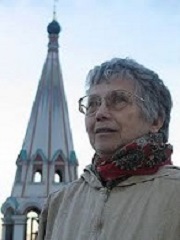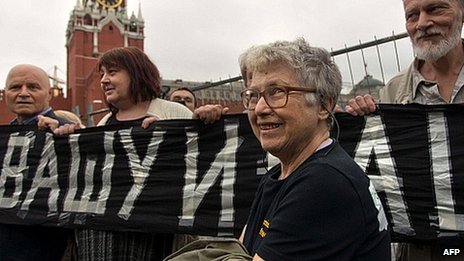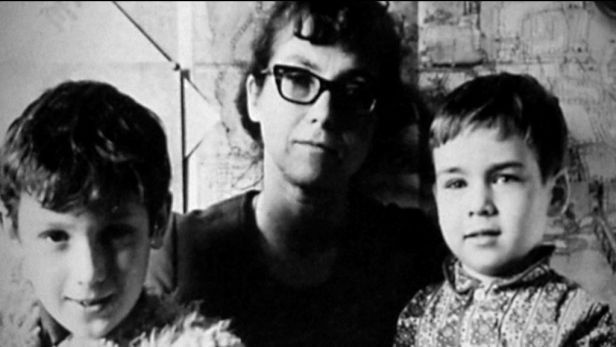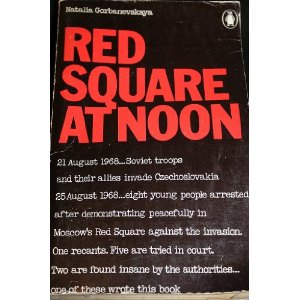
The Soviet Union had its roots in the Bolshevik revolution in 1917 and forced its totalitarian ways on its people and the world for almost all of the 20th century. Any type of dissent was met with ruthless force, but many dissidents resisted the power of the Soviet Union and made their voices heard. One person was Natalya Gorbanevskaya, a Russian poet, translator, and activist for many years. After being imprisoned in a mental hospital, her story was brought to the rest of the world, as the song "Natalia" was performed by folk singing icon Joan Baez on her live 1976 album "From Every Stage."
Natalya Gorbanevskaya was born in Moscow in 1936. She attended Moscow University, but was later expelled for her activism, so she went to Leningrad and graduated from Leningrad University in 1964. She became a technical editor and translator, and also wrote many poems. Some of her poems were political but most were of a very personal nature. She became part of a small movement in the Soviet Union who did not buy all of the state propaganda and who helped to circulate poems and other literature abroad that did not conform to the Soviet narrative.
After World War II Czechoslovakia was among the eastern European countries controlled by the Soviet Union. In early 1968 Alexander Dubcek was elected as First Secretary of the Communist Party in Czechoslovakia and he began a period of liberalization known as the Prague Spring. Restrictions on speech, the media, and travel were loosened, and the economy started moving towards decentralization and away from the total control of the state. Put simply, Czechoslovakia was moving towards being like a democracy. The changes were not received well by the Soviet Union. Soviet leader Leonid Brezhnev attempted to negotiate with the leadership of Czechoslovakia to curb the liberalization, and when this proved insufficient, the military took over. On August 21, 1968, 200,000 troops and 2,000 tanks invaded the country. There was no armed resistance to speak of, just a complete occupation of the country and reversal of all the reforms.
Back in the USSR, the state controlled media pushed its propaganda forward. The invasion of Czechoslovakia was described as the Soviets coming to the rescue of their friends who were under the attack of imperialist plots, and there was full public support. A small group of 8 protesters never believed it and 4 days after the invasion on August 25 they set up their tiny demonstration with banners written in Russian and Czech. One of these was Natalya Gorbanevskaya, who came out carrying her 3 month old son in a pram. The KGB did not allow even this tiny protest, and minutes after the protest was started the protesters were arrested and beaten. Gorbanevskaya was not arrested with the others as presumably because of the infant child that was with her at the protest. She wrote about the trial of her fellow protesters in a small publication called The Chronicle of Current Events. It was produced on smudgy mimeographed paper and self-published. While the official state publications like Pravda were thrust on the Soviet people. Gorbanevskaya's paper was circulated among other dissidents and leaked out to places outside the Soviet bloc. Natalya later published the book "Noon" about the Red Square protest and subsequent trial. The book was later translated and published in the west as under the title "Red Square at Noon."
Many dissidents wrote about life in the Soviet Union. Gorbanevskaya wrote about her compassion for the people in the Soviet satellite states such as Czechoslovakia and her guilt at being powerless to help them. Here is a section of one of her poems translated:
It was not I saved Warsaw then, or Prague after,
not I, my guilt's irredeemable,
my house hermetically sealed and cursed,
house of evil, sin, treachery and crime.
And chained by these everlasting invisible chains to it,
I'll find joy and venom in this dreadful house,
in a dark, smoky corner, inebriated, wretched,
where my people lives, guiltless and godless.
In December, 1969, Gorbanevskaya herself was arrested for her writings. The Soviet solution to a political dissident was to put them in a mental hospital, and so it was for Natalya. She was diagnosed with "continuous sluggish schizophrenia", a convenient diagnosis that allowed the KGB to confine anyone they didn't like to a psychiatric hospital. Natalya was confined to Butyrskaya psychiatric hospital and given psychotropic drugs for more than 2 years until she was released in 1972.
Word of Natalya's confinement in the mental hospital leaked out to the rest of the world. Folksinger Joan Baez took up her cause and began to sing a beautiful song Natalia, written by Iranian singer and composer Susha Guppy at her concerts. A recording of Natalia was made for the live album From Every Stage which brought Gorbanevskaya's cause to millions of people. In her introduction, Baez says:
It is because of people like Natalya Gorbanevskaya that you and I are still alive and walking around on the face of the earth.
Some of the lyrics to the song go like this:
Weaver of words
Who lives alone
In fear and sorrow
Where are the words
To set you free
Perhaps tomorrow
What is there left
Behind the door
That never opens
Are you insane
As they say you are
Or just forsaken
After her release from the mental hospital, Gorbanevskaya rejoined her dissident movement who continued to publish The Chronicle of Current Events. She was harassed and threatened continuously until she was forced to emigrate to Paris in 1975. There she continued her writings about the Soviet Union and later Russia after the Cold War ended. In her later years, she received honors from Warsaw and Prague and was granted Polish citizenship in 2005 (previously she'd been without a country of her own).
On August 25, 2013 Natalya participated in the 45th anniversary protest in Red Square. The police quickly broke up the protest, as Vladimir Putin's Russia is no more tolerant of free speech than the previous Soviet regimes. Natalya continued to write about modern Russia with the themes the same as they ever were:
The crime has not yet been expunged,
the hour of truth has not yet struck.
logs in the stove still ticking over,
although the fire's already out.
Gorbanevskaya passed away on November 29, 2013. She was 77. She did not live long enough to see the same themes playing out in 2014 Ukraine as were played out in 1968 Czechoslovakia.







JENNYCA
Just a little acntdoee. In the 1970s I was working at a university in Utrecht, in the Netherlands. Now the students then were really really leftist – they regarded communists as conservatives. Anyway, a delegation went to Russia, Leningrad I do believe, which was still communist, though thawing. Being students they looked around and met up with a Russian student; and all went back to their hotel room. The Russian in doing so was acting illegally, as I say things were thawing. After a while the Russian needed to use the washroom (one per floor) and off he went. And didn’t come back. After about 20 minutes one of the Dutch students went down the hall to see if their Russian friend was OK. They didn’t find him, but standing in the washroom door was a large KGB officer. They never did see the Russian friend again.And this was about 1975.